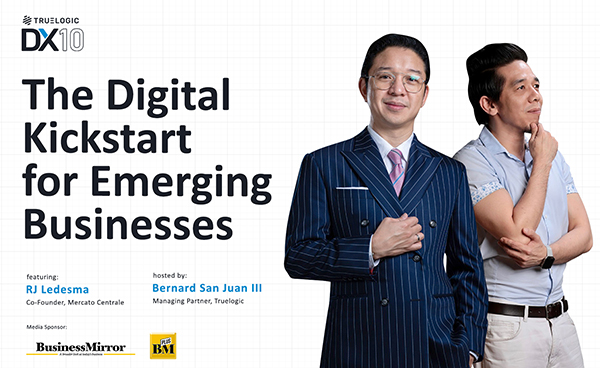Truelogic Episode 94 Recap: Integrating AI into your Content Marketing Strategy

Podcast Transcription
Berns San Juan: I have a confession. I’ve been hating on Google search results lately. It’s become very information skewed even towards the genuine searches I make that are transactional or commercially intended. You may have noticed this, right, like a simple search for something as, let’s say, you want to log into Google Analytics, it’s not on your bookmarks, and then you google Google Analytics. You will either find the actual link to your Google Analytics account as the fifth or sixth organic result or not at all. And before that, you’re going to get the analytics academy, you’re going to get another piece of informational content and whatnot, right?
This has been driving me crazy because the quality of my search experience at Google has just dwindled over the past few months. Because of how Google skews towards informationally formatted content, and remember, we SEOs, like to watch what’s happening in search. I’m seeing a lot of SEO practices not just in the Philippines but internationally. I’m seeing a lot of SEO practices globally that I dislike. I am disliking very much. People have been brute forcing their way to rank for keywords even when the intent of the keyword is not informational. So what do I mean?
I mean let’s say I want to rank for marketing agency. Instead of creating a commercially viable page for a marketing agency, I just publish a 4,000-word article or I just create a 4,000-word page about a marketing company and then I spam it full of links. So I guess as you can already tell, there’s a content warning that comes with this podcast episode. This is an opinion piece. This is a very heavy opinion piece. And I know that many people who listen to this podcast have been exploring how developments in AI can help them either automate or accelerate their business goals.
Now those are two very different things, right? Automation usually means you’re trying to control, the cost side. Acceleration usually means you’re trying to ramp up the revenue side. And of course with ChatGPT, along with all of the other AI tools that are being developed, the lowest-hanging fruit is content. Over the past few months, I’ve been getting asked, and this is like repeatedly what my opinion was on AI-generated content. And as with everything in marketing, it’s complicated.
What is AI-generated content Marketing?
Berns San Juan: Welcome to another episode of the Truelogic DX podcast. Today we are talking about AI Content Marketing. Strap in, relax, or don’t relax as I give you the pros and cons of AI-generated content marketing. Now to set expectations, about 70% of this conversation is going to talk about content marketing because I don’t think there’s a strong appreciation for its value yet. So I’m going to give you a couple of case studies that prove my point because I like to prove stuff in data. Let me walk you through the history of content marketing.
History of Content Marketing
It is the year 2007 and all through the house. No, it is the year 2007 and Google rolled out what is called the Freshness System. And SEOs call this the Freshness Algorithm. Essentially, it’s an element in the Google Search algorithm that rewards web pages that update their content. In short, you’re more likely to rank for keywords, you’re more likely to rank, you’re more likely to appear on, the first page if you are the type of brand that updates your content. So looking at you, 10-year legacy content brands. Right, it doesn’t matter how. Google just perceives that if you care about your audience, you are adapting to the times. And there’s a lot of common sense behind that.
Think of the keyword Spring Fashion. If I were doing a Google search for Spring Fashion, I would probably not looking for Spring Fashion 1999. Google is going to assume that I’m interested in Spring Fashion for 2024 because we’re recording this podcast in 2024. So it’s not going to give me that. Now, if it can’t find any great results for Spring Fashion in 2024, it’ll give me the least bad result, which would be 2023 or 2022, but whoever has updated their content.
And no, while Google trusts your domain and your website, the more it ages, it doesn’t like content that sat there and has been stagnant for 10 years. Ultimately, it… I wouldn’t say it devalues it, but it disfavors its overpressure content. Right? So that’s 2007. The freshness algorithm.
Now let’s go to March 2012. Google rolled out the infamous Panda algorithm, one of the first algorithms that Google rolled out with an actual penalty act. And this thing focuses on content quality and it shakes the world of organic search. In 2013 on Google’s 15th birthday, they revealed that they’d be rolling out the Hummingbird update. Take note, I don’t call it the Hummingbird algo because the Hummingbird is not an algorithm update, it is the search engine.
The Hummingbird update was an update to the entire Google search algorithm and it was the single biggest overhaul to the search engine since 2001. And the keyword for the Hummingbird update is context. So, 2007, 2012, 2013. How did this affect the world of SEO? Well, when the Freshness algorithm came in, you started seeing SEOs, not just in the Philippines, I will also say SEOs around the world in Australia, in the UK, in the US, all of a sudden start recommending to their clients, oh, you got to blog. Right? But I don’t think anybody ever satisfactorily explained why brands, and businesses needed to blog. And you know, it was simple. It was to leverage the Freshness algorithm. Like that was all there was to it.
Today, we don’t recommend that you blog so that you can tickle the freshness system. Today, we recommend that you blog so that you develop strong contextual relevance for an idea you want to win. So blogging is still relevant, but not for the same reason in 2008, 2012, and 2013. So blogging is how the world of SEO is affected.
Next, how else did it improve organic search results? The Panda rolls out in 2012. March, JC Penney gets penalized for beating Samsonite for the keyword Samsonite. But Google also loses money. I don’t think a lot of people appreciate that the results of the organic searches were so good post-Panda that Google lost revenue on Google Ads because the results on organic search were so good. So they improved organic search results, it also spanked a lot of bad websites and you know, to me, good riddance. I love it. I love that those non-value-adding websites are gone, but it improved organic search results.
The hummingbird is sort of trying to help marketers webmasters and brands understand what motivates search. Essentially what the hummingbird is trying to teach you to do is to assume what problem your user was trying to solve for you to satisfy that problem on your page. And so this is what I call motivated search. So all of these combined, like these three algorithms are all content related and they all make changes to the world of SEO.
Content Marketing in SEO

Today you do content marketing for SEO for a couple of reasons. A, yes, you still benefit from the freshness. If your content is of good quality, you still benefit from gaining more rankings, gaining related keywords. But the more pages you have about a specific idea, like take for example, Truelogic, like we inadvertently ranked for Web Design Company and Web Design Philippines, but we inadvertently ranked for Web Design Company.
And the reason behind that is we’ve got a commercial page on Web Design services, but we also have, I think about eight, nine well-performing blogs on Web Design, right? We’re comparing Shopify to commerce, or we’re talking about the costs of building websites in different technologies, or we even have a podcast episode about it.
And so all of those web dev and web design pieces of content together build context around how dominant and relevant the idea of web design to this website is. And apparently to Google, very relevant, right? And you know, take note, like when I do link building, like when I must, we don’t link build for a web design company. All of the links that those pieces of content have been acquiring are natural. But that’s an example of, you having a commercial idea, you surround it with a key informational idea, and then you surround both of those with multiple ideas that are contextually related to your core idea.
Okay, so I know this is not making sense so I’ve got a couple of examples for you guys. Take for example you’re in the BPO industry. The commercial keyword you’re interested in is Philippine Outsourcing Company. So you build a page for Philippine Outsourcing Company, which is your commercial page. You support it with a keystone article, something that’s 2,000 words or more, something that’s informationally motivated. And the keyword there is, let’s say, outsourcing in the Philippines. That’s the idea you want to win. And then you support that with another article that wants to win the idea for Philippine employment practices. And then another one that says, I don’t know, Asian outsourcing by the numbers, right? Like the cost of outsourcing to different countries in Southeast Asia or Asia. And Philippine outsourcing talent, right?
These could be the topics that you surround your Philippine outsourcing commercial page with and what you’ll realize is because you made the context of that page so strong, because contextually your website talks about that idea, it ranks you up for that commercial idea as you gain incidental rankings for the content that you’ve been producing. Right? So, same thing, let’s do a bank because you know I work with banks, and let’s do like one of my favorite products is a travel credit card product. So let’s do a travel credit card travel credit card Philippines. Like that’s the idea you want to win and so you’ve got a travel credit card page but you want to support that travel credit card page with contextually relevant content.
And so your contextually relevant content might be about accumulating miles, claiming miles, credit card interest rates, deferred payments, and installments. These ideas are all contextually related to travel credit cards. So I hope you’re still with me. This is sort of like the value of content marketing today. It’s more than freshness. You are leveraging freshness, quality content, and context, all together. And I’ve never seen such a great bump up in terms of the performance of websites. Now, don’t take my word for it, you know, I always like to drop numbers on you. And there have been a couple of brands that have done this well, and I’ll cite one local one. But let’s deal with an SEO company that in my opinion produces a lot of great content.
I’ve always loved, for almost as long as I’ve been in Truelogic, I’ve always loved content created by Backlinko. And he does produce terrific content. And Backlinko produces so much content that between the years of 2015 to 2024, they added 400 more pages. That’s like a 900% increase in the number of pages that they have. Their organic profit went from 18,000 monthly to over 700,000 monthly in 2024. Imagine that, right? That’s like a 4,000% increase. Now I know that we’re talking about 9 years, but still, how many of you guys listening produced 4,000% increases in your traffic in the last 9 years? So, the Backlinko does great. Produces content regularly, freshness, the content is of really high quality, Panda, and they’re all contextually related to search. Hummingbird. Right, so terrific. So Backlinko is one.
Let’s look at another. One of my favorite brands is Nike. Nike, in the year 2015, only had roughly 2,000 pages. Today Nike.com has over 700,000 pages. Right, so these guys added over 750,000 pages in the last nine years. And you can bet those 750,000 pages are not products. They’re articles about running, about basketball, about athleisure, about fashion. So how did Google reward Nike?
In the year 2015, Nike received about 1.7 million visitors every month, actually closer to about 1.8 more than to 1.7. But Nike.com used to get about 1.7 million visitors monthly. Today, they get 79 million visitors monthly, right? A 40-fold increase in traffic, that’s insane. Like that’s insane. And so a lot of that is content marketing.
Another good example, although this one you know, might need a green assault, because I can see how the brand itself is working on it, right? Like, Apple is another great example where they used to only have about 12,000 pages in 2015. Today, their web, they does have a lot of content, they publish a lot of content, and they’ve got over 200,000 pages on their website, so about a 17-fold increase in their total number of pages. They go from 28,000, and remember the first iPhone was in 2008, right? So they were already a household name by then. But they go from 28 million visitors every month to 180 million visitors between 2015 to 2024. All of this is just through the magic of content marketing.
Now, because I know that you are a Philippine audience, let’s look at a local one and let’s look at a shorter time frame. Have you guys ever gone to Hello Doctor? You know, my usual favorite is Panlasang Pinoy, right? But let’s change it up a bit. Have you guys ever visited the website hellodoctor.com.ph? In June 2020, these guys had 13 pages on their website. Today, they have 9,584 pages on the Google index. That’s nuts. That’s a lot of content production in like four years. But their traffic went from one monthly visitor a month to a million and 80,000 visitors every month, all because of content marketing.
Should You Use AI to Generate Your Content?
Where’s the AI in this conversation? So hold your horses. Here it comes. Can you use AI to generate Nike levels of content? Can you use AI to generate Apple levels of content? Can you use AI to generate Hello Doctor levels of content? And will it work? Are you going to steal keywords from competitors? Will you gain rankings for pages that you wrote content for? This is the, it’s complicated, bit, right? The short answer is yes.
Now you’ll remember in at least two episodes, I told you, I strongly discourage you, from using AI to generate your content. And I still do, by the way. This is not an AI-generated Bernard talking to you on this podcast. I’m writing these scripts. I am recording the podcast. So I strongly discourage it. Now, is there a downside to me not doing it? Yes, the downside is I have to spend more time on research. I have to spend more time doing the writing. Do I have to spend more time producing? Sure. In reality, if AI generated the script, if AI generated a lot of the content, it will work. The keyword there is for now.
The reason I discourage it is, have you guys noticed how much noise there is in detecting AI-generated content? There is a lot, right? Like everybody’s talking about, oh, they detected that the content was AI-generated, they detected this. You’ll get a penalty, whatevs, right? The bottom line is, it works right now. If I built a website today, acquired a couple of high-quality mentions and linkbacks to it, and produced 4,000-word articles on it, I bet it would rank. It will rank for at least anywhere from 40 to 60 keywords in a four-month timeframe. I’m experimenting with that right now.
The bottom line is it’ll work right now, but it is a short-term win. So should you use AI? Should you use Jarvis? Should you use ChatGPT to help you generate content? The answer is, that if your brand can take a kit from what will inevitably be a Google adjustment for AI-generated content, then you’re probably missing out on an opportunity. And so I would tell you, go ahead, right? Like if you need a win now, if you need a win four months from now, six months from now, if you need a win in the next 12 months, if you need a win in less than 24 months, then this might be a strategy for you. Just create tons of valuable content
Now remember, AI-generated, but that doesn’t mean, the AI, doesn’t copy-paste whatever you did on whatever AI content-generating tool you’re doing. Read it, make sure that it’s valuable, and make sure that it’s not harmful. I would strongly discourage you, this is in the financial and medical fields, and you’re more likely to get a penalty. Google is more sensitive to money and health-related content than it is to other content. But if your brand can take a hit, then go ahead and take the W. You might be missing out on an opportunity.
But Google is likely going to be able to detect AI-generated content. That’s one. Or two, the most likely scenario. Google will demand that we start labeling our AI-generated content. So what do I mean? Let’s go back to the algorithms that we talked about earlier, specifically the Panda algorithm because it had a penalty feature. To stop websites from spamming, from creating thin content, from linking to wherever, Google just says, you know what? If I can’t stop you from creating a commercial link, that’s fine. Go ahead and take money for pointing a link at someone, sure, but you cannot pass it authority. You cannot pass it “link juice.” The no-follow meta tag was created, right?
Like so when you point a link to someone and that link was acquired, not because you genuinely believe in the content they produced, but because they paid you $200, $100, $50 to publish that link. Google says, sure, but you got to no follow that sucker. And so you have to add the rel equals no follow net tag to that link because yes, you can link back to it. Everybody is free to link to wherever they want. But if that was commercial, that’s not organic. And so that’s one.
Two, so Google says organic links are meant to be editorial in nature, not advertorial in nature. And so Google says if your content was produced because of a commercial relationship, clearly label that that is sponsored content. More than that, they created the meta tag rel equals sponsored. This is when the content was not organically produced, it was because it was advertorial-ly motivated. It was commercially motivated.
Now, best guess, Google is probably gonna take I don’t know two years to automatically detect AI and I’m not even a believer that that’s the direction they’ll go. I think they’ll have webmasters installed at similar tanks. It could sound like, I don’t know, rel equals AI Gen, rel equals AI Gen Con, I don’t know, something like that. But I don’t believe the search engine will move fast enough to devalue all of this content tomorrow. I don’t believe it’ll move fast enough to devalue all of it in 12 months. But if you’re willing to risk the W, then you have to be ready for the hit.
Advantages and Disadvantages of Using AI in Content Marketing

Doing content marketing using AI-generated content can yield you a lot of traffic results in the short to mid-term, meaning in the next 6 to 12 months, you can earn a lot of wins. But it will come with a risk of a downside. It will not come with an absolute downside, it will come with a risk of a downside. Because when Google starts inevitably cracking down on AI content abuse, it’s not a thing right now, but it probably will be. You don’t want to be on the receiving end of Google sending you an AI content abuse love letter on your Google Search Console, or even worse yet, getting a pure spam love letter from Google inside your Google Search Console.
So if you’ve got an appetite for risk, if there’s not a lot of losses, if search, if organic traffic is not your current primary source of audience, sure, go for it. I am going to try something like this, but only on an experimental website, just because I want to be able to prove my point and then I’ll do another episode on it. But if you’re willing to take a W on the short to midterm, make sure that you’ve got an appetite for the risk, but also the potential reward.
And so that’s it for this episode of the Truelogic DX podcast. I hope it was helpful. I have been asked this question, can I use AI to do my content marketing? I’ve gotten asked this at least half a dozen times in the last six weeks, might be shorter. So I thought we’d do a specific episode on it. I want to thank our team and our friends at Podmachine for continuing to power these podcasts. We are on social media, so like, follow, subscribe to our content. Feel free to reach out to us if there are guests you’d want us to have or topics you want us to talk about. And I will see you guys on the next episode. Cheers!










